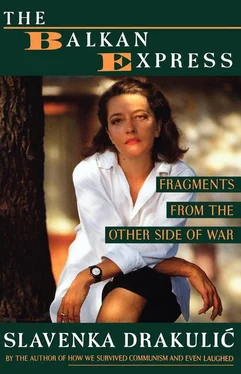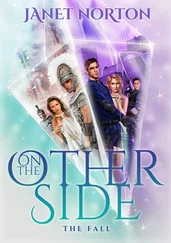Slavenka Drakulić - The Balkan Express - Fragments from the Other Side of War
Здесь есть возможность читать онлайн «Slavenka Drakulić - The Balkan Express - Fragments from the Other Side of War» весь текст электронной книги совершенно бесплатно (целиком полную версию без сокращений). В некоторых случаях можно слушать аудио, скачать через торрент в формате fb2 и присутствует краткое содержание. Город: New York, Год выпуска: 1993, ISBN: 1993, Издательство: W. W. Norton & Company, Жанр: Биографии и Мемуары, Публицистика, на английском языке. Описание произведения, (предисловие) а так же отзывы посетителей доступны на портале библиотеки ЛибКат.
- Название:The Balkan Express: Fragments from the Other Side of War
- Автор:
- Издательство:W. W. Norton & Company
- Жанр:
- Год:1993
- Город:New York
- ISBN:0-393-03496-8
- Рейтинг книги:4 / 5. Голосов: 1
-
Избранное:Добавить в избранное
- Отзывы:
-
Ваша оценка:
- 80
- 1
- 2
- 3
- 4
- 5
The Balkan Express: Fragments from the Other Side of War: краткое содержание, описание и аннотация
Предлагаем к чтению аннотацию, описание, краткое содержание или предисловие (зависит от того, что написал сам автор книги «The Balkan Express: Fragments from the Other Side of War»). Если вы не нашли необходимую информацию о книге — напишите в комментариях, мы постараемся отыскать её.
The Balkan Express: Fragments from the Other Side of War — читать онлайн бесплатно полную книгу (весь текст) целиком
Ниже представлен текст книги, разбитый по страницам. Система сохранения места последней прочитанной страницы, позволяет с удобством читать онлайн бесплатно книгу «The Balkan Express: Fragments from the Other Side of War», без необходимости каждый раз заново искать на чём Вы остановились. Поставьте закладку, и сможете в любой момент перейти на страницу, на которой закончили чтение.
Интервал:
Закладка:
The war would be there, in our words, in meaningful glances, and in the faces reflecting our anxiety and nausea. In that moment the madness we are travelling towards might become so alive among us that we wouldn’t be able perhaps to hold it back. What if one of us is a Serb? What if he says a couple of ordinary, innocent words? Would we pretend to be civilized or would we start to attack him? What if the hypothetical Serb among us keeps silent because he is not really to blame? Are there people in this war, members of the aggressor nation, who are not to blame? Or maybe he doesn’t want to hurt our feelings, thinking that we might have family or friends in Vukovar, Osijek, Sibenik, Dubrovnik, those cities under the heaviest fire? Judging from our silence, growing more and more impenetrable as we approach the Croatian border, I know that we are more than mere strangers – surly, unfamiliar, fellow passengers – just as one cannot be a mere bank clerk. In war one loses all possibility of choice. But for all that, I think the unbearable silence between us that verges on a scream is a good sign, a sign of our unwillingness to accept the war, our desire to distance ourselves and spare each other, if possible.
So we do not talk to each other. The man on my left stares out of the window, the woman opposite sleeps with her mouth half open. From time to time she wakes up and looks around, confused; then she closes her eyes again, thinking that this is the best she can do, close her eyes and pretend the world doesn’t exist. I pick up a newspaper, risking recognition – one betrays oneself by the newspapers one reads – but my fellow travellers choose not to see it. At the Südbanhof newspaper stand there were no papers from Croatia, only Borba , one of the daily papers published in Serbia. As I leaf through the pages I come across a description of an atrocity of war, supposedly committed by the Ustashe – the Croatian Army – which freezes the blood in my veins. When you are forced to accept war as a fact, death becomes something you have to reckon with, a harsh reality that mangles your life even if it leaves you physically unharmed. But the kind of death I met with on the second page of the Borba paper was by no means common and therefore acceptable in its inevitability:… and we looked down the well in the back yard. We pulled up the bucket – it was full of testicles, about 300 in all . An image as if fabricated to manufacture horror. A long line of men, hundreds of them, someone’s hands, a lightning swift jab of a knife, then blood, a jet of thick dark blood cooling on someone’s hands, on clothing, on the ground. Were the men alive when it happened, I wondered, never questioning whether the report was true. The question of truth, or any other question for that matter, pales next to the swirling pictures, the whirlpool of pictures that sucks me in, choking me. At that moment, whatever the truth, I can imagine nothing but the bucket full of testicles, slit throats, bodies with gory holes where hearts had been, gouged eyes – death as sheer madness. As I rest my forehead on the cold windowpane I notice that there is still a little light outside, and other scenes are flitting by, scenes of peaceful tranquillity. I don’t believe in tranquillity any more. It is just a thin crust of ice over a deadly treacherous river. I know I am travelling towards a darkness that has the power, in a single sentence in a newspaper, to shatter in me the capacity to distinguish real from unreal, possible from impossible. Hardly anything seems strange or dreadful now – not dismembered bodies, not autopsy reports from Croatian doctors claiming that the victims were forced by Serbians to eat their own eyes before they were killed.
Only on the train heading southeast, on that sad ‘Balkan Express’ did I understand what it means to report bestialities as the most ordinary facts. The gruesome pictures are giving birth to a gruesome reality; a man who, as he reads a newspaper, forms in his mind a picture of the testicles being drawn up from the well will be prepared to do the same tomorrow, closing the circle of death.
I fold the paper. I don’t need it for any further ‘information’. Now I’m ready for what awaits me upon my return. I have crossed the internal border of the warring country long before I’ve crossed the border outside, and my journey with the two other silent passengers, the newspaper and the seed of madness growing in each of us is close to its end. Late that night at home in Zagreb I watch the news on television. The anchor man announces that seven people have been slaughtered in a Slavonian village. I watch him as he utters the word ‘slaughtered’ as if it were the most commonplace word in the world. He doesn’t flinch, he doesn’t stop, the word slips easily from his lips. The chill that emanates from the words feels cold on my throat, like the blade of a knife. Only then do I know that I’ve come home, that my journey has ended here in front of the TV screen, plunged in a thick, clotted darkness, a darkness that reminds me of blood.
ZAGREB NOVEMBER 19917
PARIS—VUKOVAR
It was just before Christmas 1991. I was staying in Paris for a few days and at first I felt as distant from the war as it was possible to be. For two days I neither read the newspapers nor watched the news on television. Still believing it could be done, I tried to immerse myself in a different life, at least temporarily, in order to forget the life I had left behind. But my consciousness was already deeply divided, like a case of permanent double vision and there was no way to change it. Seen like that, Paris looked different, too. I walked down brightly lit streets (the brightness of lights at night that suddenly hurts your eyes) and I could hardly feel my own weight. It seemed to me I was almost floating, not touching the pavement, not touching reality; as if between me and Paris there stretched an invisible wire fence through which I could see everything but touch and taste nothing – the wire that could not be removed from my field of vision and that kept me imprisoned in the world from which I had just arrived. And in that world things, words and time are arranged in a different way. Anything at all would take me back: the bitterness of my coffee, a sort of reluctance to move, a glimpse of shoes in a shop window and then instantly a feeling of futility, remoteness, not belonging. In a Europe ablaze with bright lights getting ready for Christmas I was separated from Paris by a thin line of blood: that and the fact that I could see it, while Paris stubbornly refused to.
Only two years have passed since the Christmas of 1989: the fall of the Berlin Wall, Vaclav Havel, the death of Ceausescu, the day when I first went to midnight mass with my mother. But I can hardly remember any of that. Between then and now there is nothing, just whiteness, absence. Memories seem to have been blotted out by the burden of the present and everything that has taken place in the meantime appears tiny, distant, too trivial to be remembered. I sit in Marija’s kitchen while outside a milky fog smothers everything that is not the war. Marija tells me her war story, about her mother who no longer goes to the basement of the old people’s home when the air-raid sirens are sounded in Zagreb, how she can no longer live in Belgrade, about her son who abandoned his studies in Belgrade and came to Paris to avoid being drafted for the war against Croatia. Now she is looking for a job. Her husband keeps the TV on all the time, switching from CNN to Sky News to French news broadcasts. His spare time is spent in trying to catch as many programmes as possible, reading all the newspapers he can get hold of, both Serbian and Croatian, in an attempt to uncover the truth behind the propaganda. Then at night he tosses in his bed unable to sleep. Vukovar has already fallen, Dubrovnik is still under siege, without water and electricity. The phone keeps ringing and it seems that with each new call the number of the dead is rising dizzily. Even in this large Parisian apartment with its period furniture, thick carpets that muffle the sound of footsteps and mirrors in elaborate gilt frames, the war permeates our skin, our hair, our lungs like dust. Even those who have been living here for years cannot detach themselves completely, be truly here. The war is a seed, then a seedling and then a plant growing in each of us.
Читать дальшеИнтервал:
Закладка:
Похожие книги на «The Balkan Express: Fragments from the Other Side of War»
Представляем Вашему вниманию похожие книги на «The Balkan Express: Fragments from the Other Side of War» списком для выбора. Мы отобрали схожую по названию и смыслу литературу в надежде предоставить читателям больше вариантов отыскать новые, интересные, ещё непрочитанные произведения.
Обсуждение, отзывы о книге «The Balkan Express: Fragments from the Other Side of War» и просто собственные мнения читателей. Оставьте ваши комментарии, напишите, что Вы думаете о произведении, его смысле или главных героях. Укажите что конкретно понравилось, а что нет, и почему Вы так считаете.












